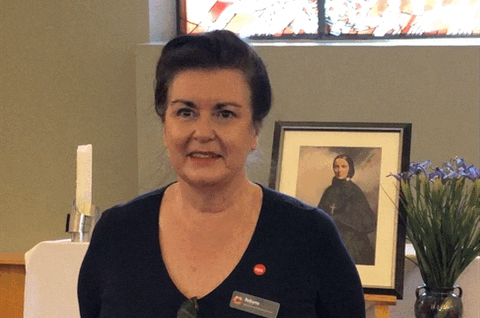IWD 2022: Leading Cabrini through COVID-19
09/03/2022

For close to four decades, Robyne Renton has dedicated her life to the health and safety of the staff and patients at Cabrini.
She has spent the past 20 years heading up the hospital’s infection control team, preparing for possible outbreaks. But two years ago, when the global COVID-19 pandemic hit, nothing could have prepared anyone in the healthcare industry for what was to come.
As part of International Women’s Day (8 March), we sat down with Robyne to talk about the incredible challenges she’s faced in the past two years.
Robyne started at Cabrini in 1985 as nurse manager of the cardiothoracic and cardiology unit. After taking on a number of roles, including setting up cardiac rehabilitation services and a pace maker clinic and a pilot project for hospital in the home for cardiac and vascular surgery patients, Robyne took over the infection control unit in 2000.
She said the role itself was focused on staff vaccinations, which at the time were for the flu and Hepatitis B, as well as usual hygiene practices.
“The biggest change in the role has been the formalisation, with the implementation of the National Safety and Quality Health Service Standards and the way governance and hospital accreditation processes are managed,” Robyne said.
“This was always part of the job, but now there’s also a focus on making sure things are documented.”
Expanding Cabrini’s campuses during the years has also meant the demand for infection control support is greater.
“It’s been very much a growing service. I started off working at Cabrini Malvern – now there are five campuses, and we have three staff members in infection control and an immunisation team.”
Robyne said during her 22 years in infection control they had prepared for pandemics, but nothing had eventuated in Australia.
“Then when we heard about what was happening in China in December 2019, we thought ‘this is the real thing’,” she said.
“By January 2020 the first COVID-19 case had been detected in Australia, so we started preparing and then in March it all escalated.”
Robyne said during the early days of the pandemic there was a lot of anxiety because no one really knew what they were dealing with.
“We were hearing reports about people, and healthcare workers, dying overseas, so it was very real anxiety. The community anxiety was huge too – but working together with everybody helped to calm that down.”
She said when the pandemic first hit, the infection control team’s main roles included making sure there was enough personal protective equipment (PPE) for staff, policies were in place, communication was clear and constant, staff were supported, wards were set up properly and that care plans were set up for patients.
While Robyne’s work life consisted around ensuring the health and safety of everyone coming in and out of Cabrini’s facilities, she also experienced the uncertainty that existed in the community.
“In the early days I remember thinking, ‘if it becomes catastrophic at least I’ve had a good life’,” Robyne said.
“It was quite frightening at the beginning and then we got more confident.”
As COVID-19 evolved, so did Cabrini’s response.
From repurposing our former rehabilitation site in Elsternwick to care for aged care residents with COVID-19, to setting up a pre-operative testing tent at Cabrini Malvern and starting our vaccination program – there were a number of challenges along the way.
Robyne said when the demand for COVID-19 testing and vaccinations increased in August 2021, Cabrini decided to establish its COVID-19 testing and vaccination clinic at our facility in Glen Huntly Rd, Elsternwick.
This clinic remained operational until December 2021, providing much needed community testing, pre-operative patient testing and vaccinations.
“It was a very important service to provide to our community, with our staff administering more than 20,000 vaccinations,” she said.
But the 65-year-old said it was the leadership by Cabrini Australia Chief Executive, Sue Williams, and Group Director Medical Services and Clinical Governance, Dr Fergus Kerr, and the way her colleagues worked together, that stood out.
“Sue and Fergus and Cabrini’s leadership team made the whole experience a lot easier because they pulled the services together. Everyone from clinical areas, including the emergency department, ICU and dedicated COVID-19 wards, through to support services had a role to play and, especially during the chaotic phases, it was a real privilege to work together,” Robyne said.
“I’ve been very fortunate that we all worked very closely together, and the infection control team always felt there was support there.
“We all sat together, we made agreements. None of us had a glass ball. We had to use common sense and good judgement, and we made sure we were all on the same page.
“I’m very appreciative of the support from Sue and Fergus, and the clinical staff – I don’t think I would have got through the past two years without it.”
With our community adapting to a new ‘COVID-normal’, Robyne’s work continues at Cabrini, to ensure the ongoing safety of our patients, staff and community.
So, after 37 years and a global pandemic, what is it that keeps Robyne showing up day after day?
She says it’s a mix of reasons, from her close-knit team, to the relationships she has built with the Cabrini Sisters.
“Ultimately, I developed a respect for the overall institute of Cabrini,” she said.
“There is a very strong, powerful female history at Cabrini. Of course, things have evolved over the years, which is a good thing – I think women are so different from men, but we need each other. Both parties bring something unique.”